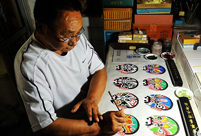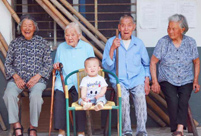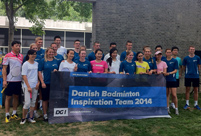 Happy life in Xinjiang
Happy life in Xinjiang
 2014 China Hainan Int'l Automotive Exhibition kicks off
2014 China Hainan Int'l Automotive Exhibition kicks off
 Collection of 'China Dream' public-spirited ads
Collection of 'China Dream' public-spirited ads
 The silent holy stones
The silent holy stones
 University students take care of giant pandas
University students take care of giant pandas
 Leading lady a true legend
Leading lady a true legend
 China Pan-Asia Stone Expo held in Kunming
China Pan-Asia Stone Expo held in Kunming
 Taiwan woman marries into Kazak family, 100 sheep plus a flat as dowry
Taiwan woman marries into Kazak family, 100 sheep plus a flat as dowry
 College girls take graduation photos under water in Chongqing
College girls take graduation photos under water in Chongqing
 Cartoon: Xi and football
Cartoon: Xi and football
Tokyo should take meaningful steps to overcome "political obstacles" that affect relations, Foreign Ministry spokesman Hong Lei told China Daily on Monday, in response to the Japanese prime minister's public call for a summit, which analysts suggested was a media ploy.
Shinzo Abe used a parliamentary session on Monday to call for a meeting with President Xi Jinping. The fact that he called for a meeting four months ahead of the APEC leaders' summit in Beijing raised suspicions that he was playing to the international audience, analysts said.
In an interview published on Monday, Abe also refused to rule out future visits to Yasukuni Shrine.
Hong said "the crux of the problem that affects the healthy development of the China-Japan relationship is clear".
"China has consistently stated its position regarding contacts between Chinese and Japanese leaders. The Japanese side should take tangible action to eliminate political obstacles that affect the development of the bilateral relationship."
Abe is playing the media card ahead of the annual summit in an attempt to depict Beijing as the villain who says no to dialogue while, in reality, the Japanese Cabinet has exercised zero self-restraint in its revisionist attitude of history, observers warned.
Lyu Yaodong, a senior expert on Japan's diplomatic policies at the Institute of Japan Studies under Chinese Academy of Social Sciences, said using the media and giving the impression of a diplomatic initiative "does not necessarily lead to successfully repairing the relationship".
"What really matters is not holding a summit, but what you have done. Abe has created serious consequences over issues of history," Lyu said.
Abe has not apologized for his pilgrimage in December to the Yasukuni Shrine, which honors 14 Class-A war criminals from World War II.
An expert panel appointed by the Tokyo Cabinet recommended a review of the Kono Statement in 1993, which includes an apology for the Japanese military forcing Asian women into sexual slavery during wartime.
Zhou Yongsheng, a professor on Japan studies at China Foreign Affairs University, said initiating media campaigns regarding summits or meetings is a "cunning strategy".
"A leaders' meeting will allow Abe to feel that he will gain more bargaining chips. If the meeting is not held, he will blame China," Zhou said.
In an interview with the Mainichi Shimbun daily published on Monday, Abe refused to rule out another visit to Yasukuni.
"In the future, I hope to maintain my feelings of respect to honor those who have given their lives for the nation, but I would rather not say whether or not I will visit Yasukuni," he was quoted as saying.
Previous Encounters of heads of states
Hu and Noda
In a brief encounter outside the APEC leaders summit in Vladivostok, Russia, on Sept 9, 2012, then-Chinese president Hu Jintao warned then-Japanese prime minister Yoshihiko Noda not to make provocations over China's Diaoyu Islands in the East China Sea.
Hu told Noda that China-Japan ties had reached a grim situation concerning the Diaoyu Islands and "any action by Japan to 'purchase' the Diaoyu Islands is illegal and invalid, and China is firmly against it".
Ignoring Hu's warning, the Japanese government the next day unilaterally announced a decision to "nationalize" part of China's Diaoyu Islands.
Xi and Abe
On Sept 5, 2013, President Xi Jinping encountered Japanese Prime Minister Shinzo Abe in the VIP room for participating leaders and had a brief talk before the 8th G20 Leaders' Summit was held in St. Petersburg, Russia.
"Japan should face up to history and keep an eye on the future, correctly deal with such sensitive issues as the Diaoyu Islands and historical issues, and seek a way to properly manage differences and address the problems," Xi said.
Abe said he had been looking forward to seeing Xi, adding: "I am eager to improve Japan-China relations."
 Children attend gymnastics training in summer
Children attend gymnastics training in summer
 Beautiful sceneries along the special travel route in Xinjiang
Beautiful sceneries along the special travel route in Xinjiang
 Germany beat Argentina 1-0 to win World Cup
Germany beat Argentina 1-0 to win World Cup
 Collection of 'China Dream' public-spirited ads
Collection of 'China Dream' public-spirited ads  Chinese Navy frogmen in training: photos
Chinese Navy frogmen in training: photos Hong Kong Fashion Festival kicks off
Hong Kong Fashion Festival kicks off How Chinese men kill the time when their wives practice square dancing?
How Chinese men kill the time when their wives practice square dancing? Lishui, city of longevity with 186 healthy men above 100 years old
Lishui, city of longevity with 186 healthy men above 100 years old Danish badminton team plays Chinese social media users on Asia tour
Danish badminton team plays Chinese social media users on Asia tour Photos of the Week
(July 6 - July 12)
Photos of the Week
(July 6 - July 12)
 'Super moon' seen in Beijing
'Super moon' seen in Beijing
 Happy life in Xinjiang
Happy life in Xinjiang
 'Finding Nemo' in Seattle Aquarium
'Finding Nemo' in Seattle Aquarium The first female Uyghur students in China's naval academy
The first female Uyghur students in China's naval academy
 Hot weather drives citizens to play mahjong in water
Hot weather drives citizens to play mahjong in waterDay|Week|Month